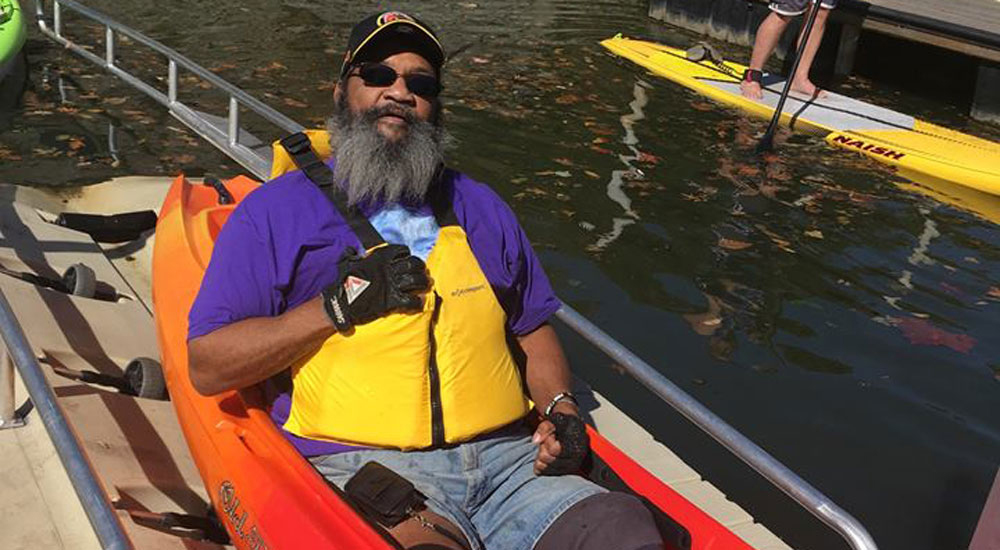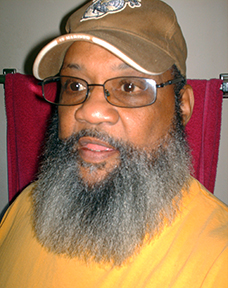Marine Corp Veteran Allan Parish wants you to know about a new VA campaign aimed at giving Veterans a better understanding of their diabetes numbers.
The “Understand Your Diabetes Numbers” campaign educates Veterans and their families on the disease. For instance, it explains hemoglobin A1C, glucose meter, blood pressure and kidney tests and other vital measurements.
After all, Parish knows how important that information is. “I was taught how to care for myself as a type 1 diabetic and what the symptoms of hypoglycemia were,” he said.
He receives care at the Parma VA community-based outpatient clinic.
One in four Veterans enrolled in VA health care services has diabetes. Consequently, this campaign encourages Veterans to be proactive with their health care teams by improving their understanding of diabetes test results.
Parish remembers he was constantly feeling run down. He drank large amounts of water and went to the bathroom frequently throughout the day.
Year-long campaign
“I knew something was wrong. Still, I didn’t realize I was a Type I diabetic until I ended up in an emergency room in Cleveland after nearly blacking out.
“Being a Type 1 diabetic requires me to pay attention to all aspects of life. Eating, exercising, taking care of wounds immediately and getting proper rest. Everything I do affects my overall health and quality of life.”
VA’s Office of Patient Care Services oversees the year-long campaign, which addresses treatment goals, medication and nutritional management. In addition, key topics include understanding the importance of hemoglobin A1c test results. Finally, the program promotes shared decision making between Veterans and their health care team.
Veterans can learn about hypoglycemia safety, insulin differences and good nutrition and carbohydrate counting. Also, about kidney function and blood pressure measurement.
Choosing Wisely®, a collective effort among professional societies, guides VA’s diabetes campaign. The goal is to reduce medical tests, treatments and procedures that may be unnecessary.
For more information, watch the VA videos Diabetes is a Disease of Numbers and Healthcare Teams Helping Veterans Understand Diabetes Numbers.
Parish adds that receiving health care from VA “lead me to become a better person and, finally, I feel great!”
Topics in this story
More Stories
The Medical Foster Home program offers Veterans an alternative to nursing homes.
Watch the Under Secretary for Health and a panel of experts discuss VA Health Connect tele-emergency care.
The 2024 National Veteran Suicide Prevention Annual Report provides the foundation for VA’s suicide prevention programs and initiatives.








The VA supplies me with test strips and a meter and lancets on the medical side but the administrative side says I don’t need them. All Vietnam vets exposed to Agent Orange has the potential to develop it.
Without exception, and upon diabetes type 2 onset on 24 Oct 1994 during a adenocarcinoma of the right ethmoid sinus that included the lifting of my brain cap and removal of two postage stamp sized pieces of my cribiform plate and a doctor’s letter validating same, I have the most comprehensive 5-times per day blood glucose testing record and analysis of anyone bar none. With my 26 year glucose testing record, I’m able to graph an aggressive Insulin protocol and bel curve along with my day to day testing to determine how well my blood sugars meet expected norms against actual progress, completely self-developed. I have been told by doctors that I am a ‘phenom’ WRT my personal health management and show little rammifications of my diabetic malady. My point is that with aggressive management of diabetes, it’s possible to live a long, active, healthy life, and know and understand the ‘why’s of living with diabetes.
My VA doc says I have type 2 diabetes, My test show I have type 2 diabetes, the VA denies my claim, saying I don’t have type 2 diabetes. What I don’t understand is that I am already at 100% so it won’t cost them any money, so why do they say my doc and the tests are wrong? The VA supplies me with test strips and a meter and lancets on the medical side but the administrative side says I don’t need them. I always have fine care on the medical side. Guess I just don’t understand big business.
By the way, I was infantry, Vietnam
Albert, I was just denied by the VA for my type-2 diabetes claim. I came across a published article that states the anthrax shots we received before we deployed over to Iraq (2004) has a link to the development of diabetes. I submitted a copy of the article along with (2) DBQ’s, one from my primary care physician and one from my endocrinologist clearing showing I’m a type-2 diabetic. The onset of my type-2 diabetes was prior to my retirement from military service (2007), and yet I was still denied. I wonder if there are other Vet’s who have received the anthrax shots and have developed type-1 or tpye-2 diabetes ???
It is time the VA was more proactive in teaching the veterans about diabetes. All Vietnam vets exposed to Agent Orange has the potential to develop it. The government gives and the government taketh away….